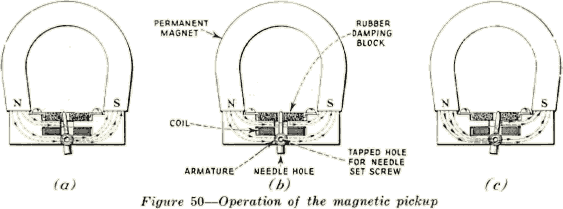70. Phonograph Pick-Up. -The magnetic pick-up used with RCA Photophone equipment is of the low impedance type. It consists of a permanent magnet, a soft iron armature, and a small coil of fine wire. The soft iron core which carries the needle is pivoted in rubber, and its upper end is held in place by a small rubber damping block. The needle and armature assembly can move slightly about the armature pivot, and with sufficient ease to prevent undue wear on the record. The armature swings back and forth as the needle follows the groove of the record, and the magnetic lines of force which pass through the armature change both in number and direction. Since a coil is wound around the armature, an alternating voltage will be generated in it. Figure 50 illustrates this action. When the armature is in the position shown in (a) of the figure, the lines of force will flow down through the armature. When it is in the position shown in (b) there are no lines of force through the armature, and when it is in the position shown in (c) the lines of force will flow up through the armature. Thus the magnetic pick-up is a small AC generator. The voltage generated alternates in exact correspondence with the sound track on the record. The voltage generated by the pick-up is very low and must be amplified many times before it can be used to operate the loud speakers.
The tone-arm pivot rests on a ball-bearing inside of a brass bushing in the tone-arm bracket. If the ballbearing is lost the tone arm may bind, causing the pick-up needle to jump the record grooves and throwing the sound out of synchronism. Therefore, avoid removing the brass bushing. A drop of oil should be applied to the tone-arm pivot about once a month.
Felt washers and sponge-rubber cushions are used at the tone-arm horizontal pivot to prevent mechanical vibrations in the turntable from affecting the sound produced by the pick-up.
If these sponge rubber cushions become shoved to one side so that the metal pivot of the tone-arm touches the metal casing, a very bad hum will be produced and can be heard from the loud speakers. To correct this, remove the tone-arm from the horizontal pivot and rearrange the sponge rubber so that the pivot is completely surrounded.
71. The Type PT-2 Synchronous Turntable. -This type of turntable is used with Types PG-1, 2, 3, 4, 6, 7 and 8 equipments. The same motor which drives the projector and sound head mechanisms is also used to drive the synchronous turntable.
2

